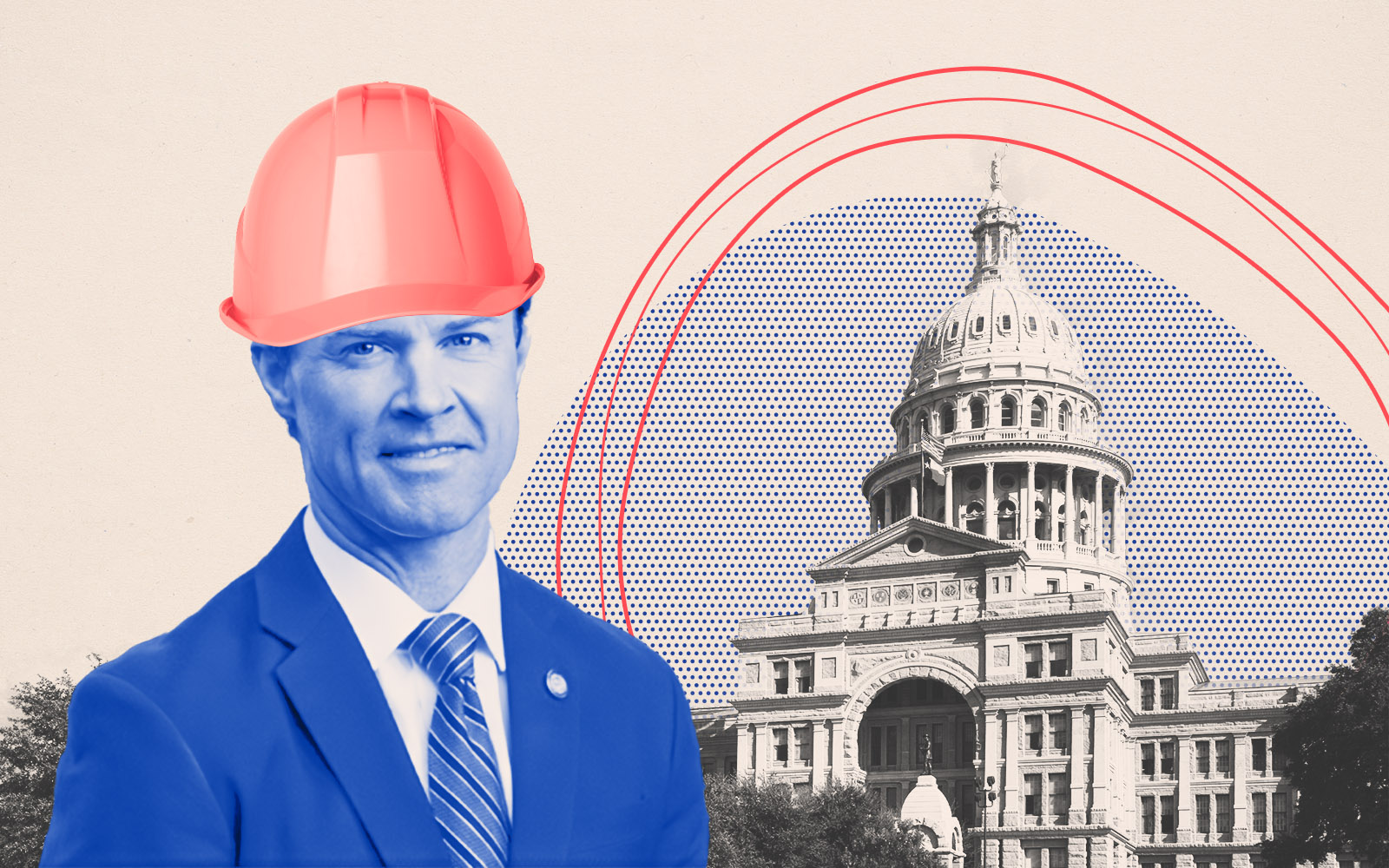In less than a week, the Texas legislative session will end — or at least that’s what state lawmakers hope. But several priorities for Texas’ top Republicans remain unaddressed, ratcheting up the chances that Gov. Greg Abbott will extend the term by calling a special session.
Property tax relief remains one of the most important question marks for the so-called “Big Three” of Abbott, House Speaker Dade Phelan and Lt. Gov. Dan Patrick, who presides over the state Senate. The top dogs met last week to talk about property taxes and two other priorities, education and power-grid reform, but those are far from the only uncertainties.
Of more than a dozen priority bills for real estate, none have reached Abbott’s desk, and those that have not been outright killed are still working their way through the Texas capitol. All the while, the clock ticks closer and closer to zero.
No chance
More than 8,000 bills were introduced in the Texas House of Representatives and Senate this session. As Republicans control both chambers and the governor’s mansion, Democrats have had little success passing new regulations on real estate. Some attempts that have failed include:
- HB 1056 and HB 1057: These bills, introduced by Rep. Gina Hinojosa, aimed to crack down on private investment firms’ activity in the single-family real estate market. One would have required investors that lease Texas homes to register their ownership information with the state, while the other would have banned investment firms from buying single-family houses that have been on the market for less than thirty days.
The bills have sat in committee since March, and in an interview with Texas Monthly, Hinojosa acknowledged their long odds.
“These bills at least start the conversation about the modern state of homeownership,” she told the publication. “We have shined a light on the problem, and that’s a necessary step towards a solution.” - HB 234: Introduced by Rep. Diego Bernal, a Democrat from San Antonio, this bill would have required sales price disclosure of commercial or industrial property sales. Similar bills have failed again and again in past legislative sessions, and the proposal faced pushback from Texas Realtors, one of the state’s top real estate lobbies. It has been stuck in the Business and Industry Committee since February.
- HB 2367: So long for now, would-be Airbnb kingpins. This bill would have barred municipalities from regulating “residential amenity rentals.” After significant public pushback, though, the bill was left pending in committee.
- House Joint Resolution 155: The “casino bill” which would have allowed destination resort casinos in Texas’ metro areas, could not gain enough votes this session, even after an extensive lobbying push by Las Vegas Sands and support from Dallas Mavericks owner Mark Cuban. “I do know when it’s time to fold ’em,” Rep. Charlie Geren, a Republican from Fort Worth and sponsor of the bill, told his colleagues as he postponed consideration of the bill.
- SB 147: Like a similar bill approved by the Florida Legislature, this proposal introduced by Republican Sen. Lois Kolkhorst aimed to prevent certain foreign entities, including citizens of China, Russia, Iran and North Korea, from buying land in Texas. The proposal was later watered down to only focus on agriculture, timber land and oil-and-gas rights, but it missed a key deadline in the Senate, so unless Kolkhorst can tack on the guts of her proposal to another bill, it’s dead for this session.
Some hope
- HB 1704/SB 2528: This bill would create a revolving mortgage loan fund to support “workforce housing,” which under the proposal’s definition means households earning between 30 and 80 percent of the area median income. It passed in the House overwhelmingly in April and was moved to the Senate.
The wording of the bill hints at a wider gap in the housing stock across the state. Its bipartisan group of coauthors, who hail from the state’s major metro areas including Harris, Bexar, Brazos and Dallas Counties, called those earners a “critical segment of this state’s population that is not often served by for-profit housing.”
Backed by Texas Association of Builders and Habitat for Humanity Texas, the fund would provide zero interest loans, to be administered by an as-yet-unselected nonprofit housing organization. The money would flow from the Texas Department of Housing and Community Affairs to the nonprofit administrator to a developer, in the form of a zero-interest loan. Only developers who are nonprofits that have been building workforce housing at those income levels for 15 years or more will be able to qualify.
- HB 3921/SB 1787: YIMBYs rejoice — though your backyard may soon get smaller. If passed, HB 3921 or its Senate counterpart would promote density by banning larger municipalities from requiring certain minimum lot sizes. By allowing developments to sit on smaller lots, cities could fit more homes per acre, increasing the housing stock.
Specifically, no municipality with more than 85,000 people in a county of 1 million or more could require lots to be greater than 2,500 square feet, wider than 16 feet, or deeper than 30 feet. The proposal also sets a minimum of 31.1 units per acre. It allows for landowners to apply for exceptions on a case-by-case basis.
- HB 14: Sick of permit delays? Relief could be on the way in the form of HB 14, a plan to drastically cut wait times, introduced by Rep. Cody Harris of Anderson.
It would require that local authorities hand down decisions on permit applications and inspections within two weeks of their review deadlines. If they fail, then the applications could be reviewed by staff from another municipality or any licensed engineer in the state of Texas.
With the support of Speaker Phelan, the bill sailed through the House and was reported favorably by a Senate committee to the full body. - HB 2789: ADUs could get a boost from this bill, which was approved by the Senate and received a favorable report from the House’s Land and Resource Management committee. The proposal would bar municipalities from banning their homeowners from using their guest houses as short-term rentals.
Who knows?
- Property tax relief: In what has proven to be one of the session’s most contentious intra-party battles, Texas’ leading Republicans agree that they want to use some of the state’s historic surplus to decrease property owners’ tax burdens, but they don’t know how.
Broadly speaking, the House has favored changes to appraisal caps, which limit the amount a home’s property valuation can rise year to year. In its latest iteration, the House proposal would limit annual valuation increases to 5 percent of a home’s value. The limit is currently 10 percent. Opponents of the plan have compared it to California’s Proposition 13, which limited increases to 2 percent of a home’s value and has decreased incentives for owners to sell.
The Senate would instead like to raise the homestead exemption, a break that limits the taxable amount of a home’s value, from $40,000 to $70,000. The plan would also increase business personal property tax exemptions from $2,500 to $25,000.
As a counter-offer, the House recently passed a new version of its bill that would boost the homestead exemption to $100,000 for most homeowners and $110,000 for seniors. However, Patrick has said any proposal with appraisal caps would not even be put up for a committee vote, let alone a full vote, so it is unclear how the two bodies will merge their plans.
Read more



